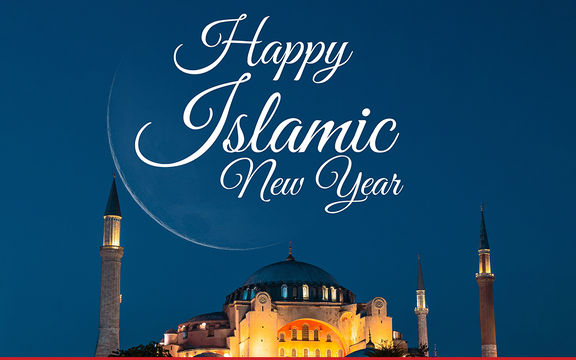Boots
Urednik
Urednik Foruma
- Regist
- 11-03-2024
- Poruka
- 4,503
- Reakcije
- 340
- Bodovi
- 216

- Pokretač Teme
- Urednik
- #1
When is Muharram 2025?
Muharram 2025 will mark the start of the New Islamic Year 1447 Hijri. The expected Gregorian Date of 1st Muharram 2025 is Sunday, July 7th, or Monday, July 8th, 2025 depending on your location and sighting of the Moon of Muharram 1447. Islamic Calendar 2025
Significance of Muharram
Muharram is not only the 1st month of the Islamic Calendar which marks the New Islamic Year but also one of the four sanctified months of the year. As Allah Says in Quran:
“Indeed, the number of months with Allah is twelve [lunar] months in the register of Allah [from] the day He created the heavens and the earth; of these, four are sacred.”
(Surah At-Taubah 9:36)
The four months mentioned in the Ayah are Dhul-Qadah, Dhul-Hijjah, Muharram, and Rajab. This is evident from the words of Holy Prophet (S.A.W.) on the occasion of his last Hajj Sermon:
“The year is of twelve months, out of which four months are sacred: Three are in succession Dhul-Qadah, Dhul-Hijjah and Muharram, and (the fourth is) Rajab.”
(Sahih Bukhari: 3197)
These words of our Prophet (S.A.W.) confirm the sanctity of the month of Muharram.
The specific mention of these four months does not mean that other Islamic months have no sanctity; in fact, each Islamic month has its own sacredness and we all know that Ramadan is admittedly the most sanctified month in the year. But Allah Almighty has chosen a particular time for His special blessings and these four months are among those particular times in which a Muslim can get the maximum of Allah’s blessings.
The word ‘Muharram’ in its literal sense means forbidden. Similar to the other sacred months, waging war or indulging in any kind of violence during this month is forbidden. (Ref: Surah At-Taubah 9:5)
History of Hijri Calendar
Before the Hijri calendar came into use, Muslims used ‘Am Al-Fil’ (the year in which the Prophet Mohammad (S.A.W.) was born), to demarcate date and time. But second Caliph Umar ibn Khattab (R.A.) established a new calendar and, after many suggestions from Companions (R.A.), he announced that the year in which the Prophet Mohammad (S.A.W.) migrated would mark the beginning of the Hijri calendar. The calendar would begin with the month of Muharram and end with the month of Dhul Hijjah. Consequently, 622 AD [the year of the Prophet’s (S.A.W.) migration] became the first year in the Hijri Calendar.
Fasting during Muharram
Muharram holds great significance long before the Prophet Mohammad’s (S.A.W.) time. Earlier on, it was obligatory to fast on the 10th of Muharram. However, later, fasting was made obligatory in Ramadan only, and fasting on 10th Muharram was made optional. As narrated by Ayesha (R.A.) that Prophet (S.A.W.) said:
“Whoever wishes to fast (on the day of ‘Ashura’) may do so; and whoever wishes to leave it can do so.”
(Sahih Bukhari: 1592)
But remember one thing that fasts during the month of Muharram is the most rewarded ones among the optional (Nafil) fasts in the light of following Hadith:
‘The Messenger of Allah (S.A.W.) said: “The best fasting after the month of Ramadan is the month of Allah, Al-Muharram.”’
(An-Nasai: 1613)
The hadith does not mean that the award of Muharram’s fasts can be achieved only by fasting the whole month. On the contrary, each fast during this month has its own merits. Therefore, one should avail of this opportunity and fast as much as one can during this blessed month.
Muharram 2025 will mark the start of the New Islamic Year 1447 Hijri. The expected Gregorian Date of 1st Muharram 2025 is Sunday, July 7th, or Monday, July 8th, 2025 depending on your location and sighting of the Moon of Muharram 1447. Islamic Calendar 2025
Significance of Muharram
Muharram is not only the 1st month of the Islamic Calendar which marks the New Islamic Year but also one of the four sanctified months of the year. As Allah Says in Quran:
“Indeed, the number of months with Allah is twelve [lunar] months in the register of Allah [from] the day He created the heavens and the earth; of these, four are sacred.”
(Surah At-Taubah 9:36)
The four months mentioned in the Ayah are Dhul-Qadah, Dhul-Hijjah, Muharram, and Rajab. This is evident from the words of Holy Prophet (S.A.W.) on the occasion of his last Hajj Sermon:
“The year is of twelve months, out of which four months are sacred: Three are in succession Dhul-Qadah, Dhul-Hijjah and Muharram, and (the fourth is) Rajab.”
(Sahih Bukhari: 3197)
These words of our Prophet (S.A.W.) confirm the sanctity of the month of Muharram.
The specific mention of these four months does not mean that other Islamic months have no sanctity; in fact, each Islamic month has its own sacredness and we all know that Ramadan is admittedly the most sanctified month in the year. But Allah Almighty has chosen a particular time for His special blessings and these four months are among those particular times in which a Muslim can get the maximum of Allah’s blessings.
The word ‘Muharram’ in its literal sense means forbidden. Similar to the other sacred months, waging war or indulging in any kind of violence during this month is forbidden. (Ref: Surah At-Taubah 9:5)
History of Hijri Calendar
Before the Hijri calendar came into use, Muslims used ‘Am Al-Fil’ (the year in which the Prophet Mohammad (S.A.W.) was born), to demarcate date and time. But second Caliph Umar ibn Khattab (R.A.) established a new calendar and, after many suggestions from Companions (R.A.), he announced that the year in which the Prophet Mohammad (S.A.W.) migrated would mark the beginning of the Hijri calendar. The calendar would begin with the month of Muharram and end with the month of Dhul Hijjah. Consequently, 622 AD [the year of the Prophet’s (S.A.W.) migration] became the first year in the Hijri Calendar.
Fasting during Muharram
Muharram holds great significance long before the Prophet Mohammad’s (S.A.W.) time. Earlier on, it was obligatory to fast on the 10th of Muharram. However, later, fasting was made obligatory in Ramadan only, and fasting on 10th Muharram was made optional. As narrated by Ayesha (R.A.) that Prophet (S.A.W.) said:
“Whoever wishes to fast (on the day of ‘Ashura’) may do so; and whoever wishes to leave it can do so.”
(Sahih Bukhari: 1592)
But remember one thing that fasts during the month of Muharram is the most rewarded ones among the optional (Nafil) fasts in the light of following Hadith:
‘The Messenger of Allah (S.A.W.) said: “The best fasting after the month of Ramadan is the month of Allah, Al-Muharram.”’
(An-Nasai: 1613)
The hadith does not mean that the award of Muharram’s fasts can be achieved only by fasting the whole month. On the contrary, each fast during this month has its own merits. Therefore, one should avail of this opportunity and fast as much as one can during this blessed month.





